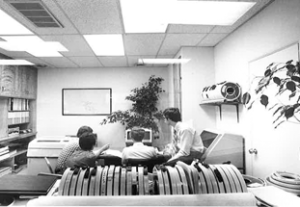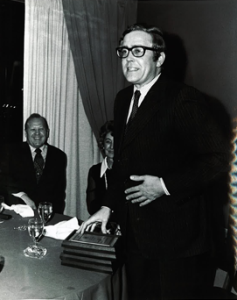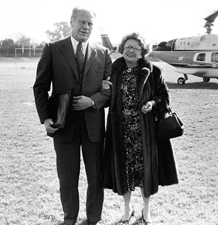In 1973, businesswoman and lawyer, feminist and activist Edessa Rose founded the Rose Institute of State and Local Government as a part of Claremont McKenna College to address issues specific to California’s state and local governments. From demographics to redistricting, from legal and regulatory analysis to budgets and public finance, the staff, faculty, and students of the Rose Institute have published studies that tracked, and in many cases shaped, policy in California for more than three decades.

In its early period (1973-1990), the Rose Institute developed the nation’s first comprehensive statewide demographic and political database. The California Database at the Rose Institute was at the cutting edge of Geographic Information System (GIS) technology and the nation’s leader in census tracking. Faculty, staff, and students worked together to match California’s 50,000 precincts to its 5,000-plus census tracts, following the political and demographic trends in the State. The Institute maintained this database from 1974 through 1990 and provided not only a rich source of research and study, but also of revenues for the Institute. In 1979, the California Business Roundtable gave a million dollar grant to fund a significant redistricting reform and education program at the Institute. The Ford Foundation also commended the Rose Institute for undertaking a complex and delicate study of South Central Los Angeles during the 1993 Rodney King riots.
Among the most notable of the research programs of this period were the REDIS system, one of the first fully computerized redistricting capabilities, which was used in several states, the Institute’s Latino studies program (directed by Professor Richard Santillan and involving Professor Armando Navarro), and various election studies. Later, the California Database was used to generate studies of demographic change in the State. The first such study focused on California’s Latino population: in addition to an atlas illustrating the rapid growth of Latino population in different parts of California, there were studies of Latino voting behavior, opinion, voluntary organizations, and Latino-owned businesses. A second atlas focused on Filipino population in California, a third on Chinese, and a final study on African Americans.
The Rose Institute played a significant part in the California redistrictings of 1970-73, 1980-83, and 1991, attracting controversy with its attempts to shed light on politically-motivated, incumbent-led district plans. Professors Leroy Hardy and Alan Heslop authored nationwide surveys of reapportionment politics for each decade. By 1990, the California Database was no longer seen as critical to the Institute’s programs: a state-supported database came into being at about this time and much other data became publicly available (for example, CD-ROM versions of US Census); therefore, instead of building a general demographic political database for the State as a whole, the Institute took on the more complex and challenging task of creating “multi-layered” data for southern California’s communities.

Many faculty members, staff and research associates have contributed to Institute programs over the years. To mention only a few, Leroy Hardy and T. Anthony Quinn have contributed to redistricting work, Jerome Garris and James Pinter-Lucke to modeling, Ralph Rossum and Alfred Balitzer to political and environmental studies, Florence Adams, Robert Walters, and Douglas Johnson to GIS, Richard Santillan and Armando Navarro to Latino studies, Steve Frates and Eric Norby to fiscal analysis, David Huntoon and Marionette Sison Moore to surveys, Gary Kovall to legal and regulatory analysis, and William Brown to economic analysis and data book development.
From the start, the Institute committed itself to conducting research with faculty-student teams. Moreover, although Edessa Rose launched the Institute with a pledge of $1 million, the pledge was not satisfied until 1987, and the Rose Institute worked without endowment for more than a decade: at the beginning, therefore, it was a bootstrap operation in which students played crucial roles.
Other donors have contributed to endowment for the continuing benefit of the Institute’s students and programs. Many student managers and project leaders have served as Margaret Martin Brock interns or J. Cleveland McKenna student researchers. Gifts and guidance from Donald McKenna and Priscilla Fawcett were important at key points in the Institute’s development. A generous endowment provided by Marian Miner Cook supports the student research team. Contributions from members of the Board of Governors have opened up further opportunities for our students and assisted research of many kinds. Mr. Ralph B. Woolley has inspired and underwritten a series of studies of San Diego schools and local government and recently provided grants to study redistricting reform. Mr. W. Richard Cramer made generous grants to support work on Riverside County. An endowment created by Mr. Frederick Hibberd continues to provide income in support of our programs. Dr. Leroy Hardy, who was long senior associate of the Institute made generous gifts of endowment, books, and redistricting archive materials.

Over the years, more than 300 students of Claremont McKenna College, Claremont Graduate University and the other Claremont Colleges have worked in the Rose Institute. Students have contributed significantly to the Institute’s survey research programs, providing high-quality interviewing services, assisting in data presentation, and often playing key roles in analysis. Today, all Rose Institute students are trained in GIS, survey research, fiscal analysis, and legal and regulatory analysis.
Edessa Rose, Jon Lovelace, Billy Mills, and Mildred Younger were among the first members of the Board of Governors under the chairmanship of Robert Finch. Later chairs were Donald Henriksen, Robert Howard, Brandon Birtcher, Allan Lunsford and Darryl Wold. Board members have included Jess Unruh, March Fong Eu, Richard Katz, Ernie Dronenburg, Pete Wilson and Senator Bob Hertzberg. Alan Heslop was the founding director of the Institute and served in that capacity for nearly three decades. Ralph Rossum started his term of service in the 2000-2001 academic year and continued as director through 2010. Andrew Busch, Crown Professor of Government and George R. Roberts Fellow, served from January 2011 through June of 2021. Kenneth Miller, the Rose Professor of State and Local Government at Claremont McKenna College, took over the role in July of 2021.
In 2010, the Rose Institute partnered with the Lowe Institute for Political Economy to establish the Inland Empire Center. Before the partnership, there was very little political and economic analysis of the region, despite the Inland Empire ranking as the 14th largest metropolitan statistical area (MSA) in the United States at the time. Recognizing the significance of the region to California’s economy, the two institutes – both based at Claremont McKenna College – saw the need for an organization that could deliver analysis on current issues impacting the Inland Empire.
